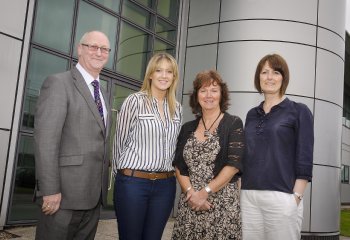
Social enterprises which provide health and social care services across Northern Ireland have benefited from the skills and expertise of University of Ulster Occupational Therapy students.
Fifty eight BSc (Hons) Occupational Therapy students took part in the university’s ‘role emerging’ placements scheme -a two week programme involving a wide cross section of community organisations and social enterprises, working with people of all ages and from very different backgrounds.
Lucia Ramsey, lecturer in Occupational Therapy and Practice Placement Co-ordinator for OT explained role emerging placements happen within a non-traditional setting where there is no occupational therapist working. She said she was delighted with the success of the placements, not least because it made the students realise the wealth and variety of career opportunities open to them as professional occupational therapists.
“The students said they benefited from experiencing the strong link between health and social care and social enterprise from a totally different perspective and that they now feel a lot more confident in their own ability to promote OT and provide OT in a setting where they have no direct OT professional supervision," she explained.
"Most would have liked to spend longer on their role emerging placement and many have even returned to volunteer in their chosen organisations. The organisations also benefited from the students’ skills and expertise so it was a ‘win win situation for everyone involved.”
She continued: “One of the difficulties facing professional occupational therapists is that not everyone is familiar with what we do.
“Professional occupational therapists we are concerned with promoting health and well-being through occupation. Our primary goal is to help people participate more fully in everyday activities. "We do this by enabling people to do things that will enhance their ability to participate or by modifying the environment to better support participation.
“We work with people of all ages to help them overcome the effects of disability caused by physical or psychological illness, ageing or accident. With areas of knowledge such as biological sciences, behavioural sciences, occupational therapy knowledge and skills, creative management skills, therapeutic interventions, environmental adaptations and research, the profession offers enormous opportunities for career development and endless variety.”
Social enterprises involved in the role emerging placements included Triangle Housing Association Progression to Employment Service which provides support and assistance to people with a learning disability to help them get employment.
Norman Sterritt, Supported Employment and Community Services Manager at Triangle explained that Triangle encompasses two complementary service models: the supported employment model; and social enterprise model.
“Students identified areas where occupational therapists could support the service currently being provided, including work focused assessments, advice and recommendations to trainees and staff to enable more information on clients’ needs and functional abilities to be shared with all stakeholders.
"Recommendations on reasonable adjustments, specialist equipment and environmental adaptations along with individualised programmes to suit trainees and their employees are also areas of specialist OT practice identified by the students which could support the service.
"On-site supervisors reported the students made ‘an excellent contribution to the work of the departments as a whole, showing initiative and introducing fresh ideas.”
He added: “We provided work-based learning opportunities for six OT students and we were delighted with the success of the initiative. We are always interested in opportunities to broaden and enhance our approach to service delivery and even over a relatively short timeframe the OT’s on placement brought new thinking and ideas to our service.
"A very positive experience and we look forward to engaging with the University and students for future placements.”
Patchwork Ireland, a Coleraine based Drugs and Alcohol Rebuilding Project which provides emotional and practical support to individuals who have experienced circumstantial change, trauma or crisis leading to isolation, depression, addiction issues and relationship problems was also involved in the initiative.
The on-site supervisor Jason Lodge reported the OT student was a ‘great asset to the organisation and that there was a clear role for an OT working in the setting.
Another social enterprise to benefit was the North and West Belfast ‘NOW’ project which provides quality training and employment services for people with learning difficulties. The students identified potential benefits of OT intervention to the project. These included the development of new, occupation focused courses, the completion of work-site assessment and addressing the sensory needs of service users.
Commenting on the students’ input, their supervisor said that they had ‘made a massive impact on the work of NOW’ and as a result wanted ‘to develop a stronger link with OT’.
The University’s Office of Innovation leads on Ulster’s collaboration with social enterprises, matching their business needs to academics and students through a number of relevant programmes and initiatives.
Commenting on the success of the placements, Kerry Patterson, Business Liaison Manager with the Office of Innovation said: “We are delighted to be working closely with the School of Health Sciences to bring this opportunity to the social economy sector.
"The students have demonstrated the relevance of their transferable skills and the social enterprises who have participated to date have been very complimentary in their feedback.”
Placements take place during January. To find out more about opportunities for 2013 please contact Lucia Ramsey, Lecturer in Occupational Therapy and Practice Placement Co-ordinator for OT, University of Ulster atl.ramsey@ulster.ac.uk
Caption (from left to right) Norman Sterritt, Triangle Housing Association Progression to Employment Service; Olivia McVey: University of Ulster OT graduate; Dr Patricia McClure, Associate Head of School of Health Sciences and Kerry Patterson, University of Ulster Office of Innovation

















